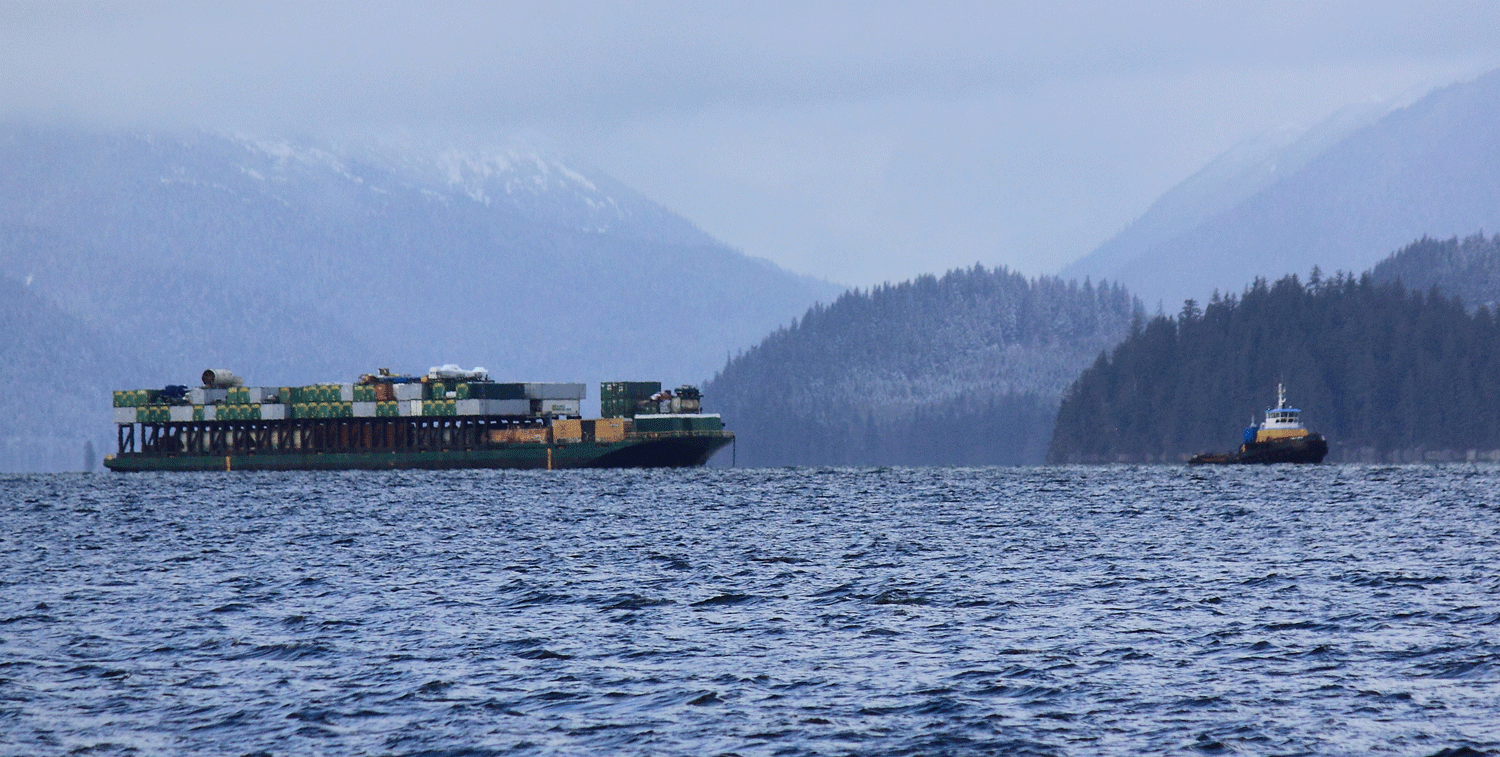Barging Freight in Southeast Alaska
/
The tug WESTERN TITAN with freight barge in tow in Wrangell Narrows near Petersburg, Alaska.
This tug and barge are hauling our groceries and other goods through Wrangell Narrows, where the channel is 200 feet wide and the currents are wicked at times. The captain and crew have the cable shortened up so that they can maneuver through this winding waterway. That 108 foot tug boat has 4500 horsepower! My plan is to stay out of their way.

Tug boat WESTERN TITAN.
This is how we get a LOT of our stuff to Southeast Alaska. Only three towns in this region have road access that connects them to Canada and the lower 48 states. Most of the towns have to get their goods by water or air.
The tug and barge below are delivering fuel. Gasoline, diesel, and aviation fuel are refined down south and barged into Southeast Alaska.

Tug ERNEST CAMPBELL with fuel barge in tow in Zimovia Strait near Wrangell, Alaska.
Want to move a construction outfit from Wrangell to Sitka? The town of Wrangell is on Wrangell Island, and Sitka is on Baranof Island, so the best method is by barge.

Barge loaded with construction equipment moored near Wrangell Island. Um, Guys? Close the excavator door so that it won't snow inside the cab.
Or maybe you just want to move your hunting SUV or van from Zarembo Island to Wrangell. A landing craft is just the ticket for that.

Landing craft hauling a vehicle into Heritage Harbor in Wrangell, Alaska.
They just pull up to the boat launch ramp, lower the bow gate, put out the wheel ramps, and away you go!

Landing craft unloading a van at the boat launch ramp.
But back to the freight barge...
Once a week 'the barge' brings fresh groceries and most of our other goods to town. The bigger towns in Southeast get barge service twice a week in the summer time. In each town the residents know what day the barge comes in. It is not uncommon to run low on milk a few days before barge day.
The barge arrives early Monday morning in Wrangell.

Tug BRENDA H pushing the barge to the dock in Wrangell, Alaska.

Unloading freight in Wrangell.
First a truck and excavator needed to be driven off of the barge deck. But the excavator wouldn't start. The crew worked on it, and two hours later drove it up the ramp. Then the giant forklift started moving containers off of the deck and into the freight yard.
So you want to send Grandpa's great big green band saw to your niece in Alaska? Truck it to Northland Services or Alaska Marine Lines in Seattle, and have it put on the barge.

Band saw, truck, and containers being unloaded using a forklift.
This reminds me of Tonka Toys.

With the small stuff out of the way the forklift picks up the forty-foot containers and moves them ashore.

Unloading a forty-foot container.
This is a small barge that is used to service some of the smaller communities in winter.
The barge in the picture at the top of this page is over 80 feet wide. There are even bigger barges that take cargo across the Gulf of Alaska to be put onto the rail line that goes to interior Alaska. We saw one of those barges (picture below) last year. It was making circles in calmer inside waters while waiting for the weather to settle down out in the gulf.

Oceangoing tug and barge in the protection of the islands, waiting for the weather on the outside to settle down.

Loading containers onto the barge.
Back at the Wrangell barge... all of the freight was unloaded and the crew put empty containers from last week onto the barge. Then the balky excavator was loaded back on, too.
The tug BRENDA H backed the barge away from the dock, untied from it's side, and towed it off to Petersburg to deliver their freight.

Tug BRENDA H towing the barge out of Wrangell.
We'll see them in another week.
I hope to see you soon!
Alaska Beachcomber
P.S. Thank you Ron R. for letting me know what time the barge would arrive!
Great finds
- Casino Sites UK
- Best UK Non Gamstop Casinos
- Non Gamstop Casinos
- Non Gamstop Casinos
- UK Casinos Not On Gamstop
- Non Gamstop Casino
- Gambling Sites Not On Gamstop
- Non Gamstop Casino
- Non Gamstop Casino
- Non Gamstop Casino Sites UK
- UK Casino Not On Gamstop
- Meilleur Casino En Ligne
- Gambling Sites Not On Gamstop
- Best Casinos Not On Gamstop
- I Migliori Casino Non Aams
- Non Gamstop Casino Sites UK
- Casino Sites Not On Gamstop
- Non Gamstop Casino
- Casinos Not On Gamstop

